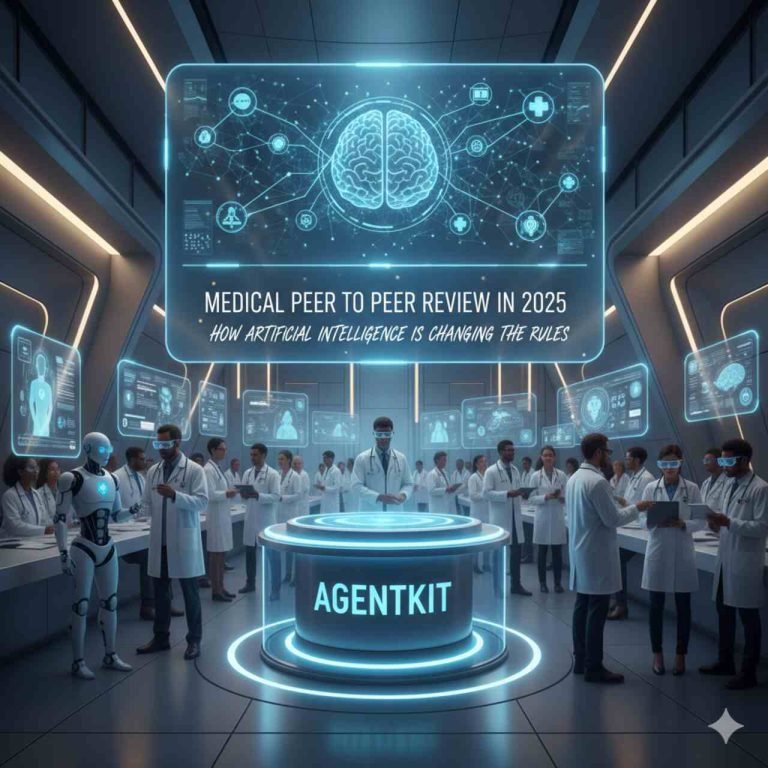The world of healthcare is shifting faster than anyone imagined. Between tighter compliance standards, burnout among clinicians, and the growing pressure to deliver better patient outcomes with fewer resources, healthcare organizations are being forced to rethink how they evaluate and improve care.
One area undergoing quiet but significant transformation? Medical peer to peer review.
Traditionally, peer reviews were manual, time-consuming processes, phone calls between providers, document exchanges, and long turnaround times. But in 2025, Artificial Intelligence (AI) is beginning to rewrite the rules.
AI isn’t replacing human judgment, it’s reshaping how that judgment is supported, analyzed, and delivered.
Why Peer to Peer Review Still Matters
At its core, peer to peer medical review exists to promote accountability and fairness in healthcare decisions. When one clinician reviews another’s medical decision whether it’s a denied claim, a surgical outcome, or a disputed diagnosis, the goal is not punishment, but improvement.
For hospitals, health systems, and Federally Qualified Health Centers (FQHCs), these reviews help:
- Ensure quality of care through unbiased clinical evaluation.
- Support compliance with HRSA and CMS requirements.
- Resolve disputes with payers or internal teams.
- Improve patient safety by identifying trends or errors early.
But the traditional process has long been plagued by inefficiencies. Matching the right reviewer, coordinating schedules, and managing documentation all add delays. For facilities with high patient volumes, this can create a backlog that undermines the very purpose of peer review.
The AI Shift: What’s New in 2025
In 2025, AI-driven peer to peer review systems are emerging as a bridge between efficiency and accuracy. Instead of sifting through endless spreadsheets or relying solely on human coordination, hospitals can now leverage smart tools that help streamline the process from start to finish.
Here’s how AI is quietly transforming the landscape:
1. Smarter Reviewer Matching
AI tools can analyze case data such as specialty, complexity, and clinical context and automatically match it with a reviewer who has the right expertise. Platforms like Medplace, which already connect hospitals with qualified providers across 132 specialties, are starting to integrate this kind of intelligence to speed up matching and ensure fairness.
2. Automated Pre-Review Analysis
Before a case even reaches the reviewer, AI can summarize clinical documentation, highlight discrepancies, and identify missing data. That doesn’t replace the reviewer’s judgment but it allows them to focus on what really matters.
3. Predictive Compliance Checks
AI systems can flag documentation patterns that might conflict with HRSA or hospital compliance standards, helping facilities stay aligned with HRSA requirements for FQHCs and other oversight agencies.
4. Faster Turnaround Without Sacrificing Quality
Hospitals no longer have to wait days or weeks for peer reviews to close. AI-supported platforms are shortening review times while maintaining rigor, allowing hospitals to act faster on findings.
A Healthy Dose of Skepticism
Of course, not everyone is convinced. While AI can process data in milliseconds, it still lacks the nuanced reasoning that defines clinical expertise. Over-reliance on algorithms could lead to:
- Oversimplification of complex clinical scenarios.
- Biases rooted in the data used to train the systems.
- Reduced transparency, if hospitals can’t explain how AI-assisted conclusions were reached.
And there’s another concern human trust. Physicians may hesitate to accept feedback that feels computer-generated rather than peer-informed. For peer review to remain credible, it must feel both objective and personal.
Where AI and Human Expertise Meet
The smartest path forward isn’t replacing reviewers, it’s enhancing them. AI can handle the administrative heavy lifting, while human reviewers bring empathy, judgment, and clinical context.
This hybrid approach ensures that reviews remain fair, fast, and credible. For instance:
- AI handles logistics (case routing, data extraction, compliance flagging).
- Humans provide insight (interpretation, clinical reasoning, professional recommendations).
Together, they form a loop of continuous improvement, one that benefits both hospitals and patients.
Why Independent Review Still Matters
Even with AI, there’s still a strong case for independent oversight. External peer review ensures objectivity, especially in cases that involve internal bias or conflict of interest.
Platforms like Medplace make this process easier by connecting organizations with a large network of credentialed providers for rapid, unbiased evaluations. Combined with AI tools, this creates a system where:
- Reviews are faster but still evidence-based.
- Findings are consistent with compliance and HRSA standards.
- Feedback contributes directly to quality improvement and patient safety programs.
It’s not just about technology, it’s about trust.
Looking Ahead: What 2025 Teaches Us
The rise of AI in medical peer to peer review is a reminder that progress in healthcare doesn’t come from one innovation alone. It comes from combining smart technology with human integrity.
As hospitals and FQHCs continue to modernize, the focus shouldn’t be on automating decisions but on improving how those decisions are made.
The future may bring even more advanced predictive tools, systems that anticipate high-risk cases or flag potential compliance issues before they arise. But for now, the key is balance:
- Use AI for speed.
- Use humans for understanding.
- Use peer review for accountability.
Final Thoughts
In 2025, AI is changing the rules of medical peer to peer review, but it’s not rewriting the purpose. The heart of peer review, improving care through collaboration remains unchanged.
What’s evolving is the how: faster data analysis, smarter reviewer matching, and stronger compliance alignment. And for organizations that embrace both automation and independence, the payoff is clear safer care, stronger compliance, and a more efficient path to quality.
Because in healthcare, technology can assist but trust, expertise, and peer insight will always lead the way.

